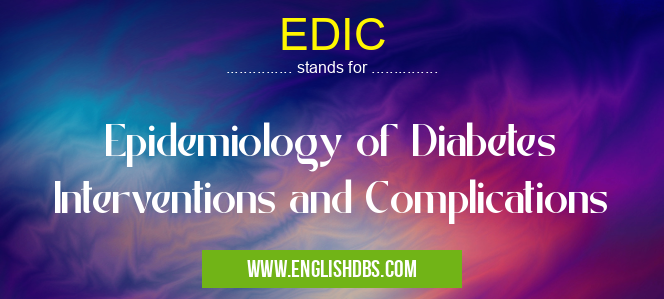What does EDIC mean in DISEASES
EDIC stands for Epidemiology of Diabetes Interventions and Complications. It is a large-scale, long-term study that investigates the natural history and progression of type 1 diabetes and its complications. The study's primary goal is to understand the impact of different interventions and therapies on the development of complications in individuals with type 1 diabetes.

EDIC meaning in Diseases in Medical
EDIC mostly used in an acronym Diseases in Category Medical that means Epidemiology of Diabetes Interventions and Complications
Shorthand: EDIC,
Full Form: Epidemiology of Diabetes Interventions and Complications
For more information of "Epidemiology of Diabetes Interventions and Complications", see the section below.
What is EDIC?
EDIC is a prospective cohort study that began in 1986 and involves over 1,700 participants with type 1 diabetes. The study participants are followed regularly through comprehensive examinations and surveys, which include assessments of blood glucose control, cardiovascular health, renal function, eye health, and neurological function.
EDIC's Objectives and Focus
- Investigate the long-term effects of intensive blood glucose control on the development and progression of diabetes complications.
- Identify risk factors for developing diabetes complications, such as retinopathy, nephropathy, and neuropathy.
- Evaluate the effectiveness of various interventions, including insulin therapy, diet modifications, and lifestyle changes, in preventing or delaying complications.
- Provide valuable insights into the natural history of type 1 diabetes and its complications.
EDIC's Key Findings and Impact
EDIC has made significant contributions to the understanding of type 1 diabetes and its complications, leading to improved clinical guidelines and patient care. Some of the key findings from the study include:
- Intensive blood glucose control reduces the risk of developing diabetes complications.
- Specific interventions, such as aspirin therapy and ACE inhibitors, can prevent or delay the progression of certain complications.
- Regular monitoring and early detection of complications are crucial for effective management and prevention of severe outcomes.
Essential Questions and Answers on Epidemiology of Diabetes Interventions and Complications in "MEDICAL»DISEASES"
What is the EDIC study?
The Epidemiology of Diabetes Interventions and Complications (EDIC) study is a long-term research project that has been following a group of people with type 1 diabetes since 1986. The study has collected data on the participants' health, lifestyle, and medical treatments, and has used this data to investigate the causes and complications of type 1 diabetes.
What are the goals of the EDIC study?
The goals of the EDIC study are to identify the risk factors for developing complications from type 1 diabetes, to understand the natural history of these complications, and to develop strategies for preventing and treating them.
What have been the major findings of the EDIC study?
The EDIC study has found that people with type 1 diabetes are at increased risk for developing a variety of complications, including heart disease, stroke, kidney disease, eye problems, and nerve damage. The study has also found that the risk of developing these complications is related to a number of factors, including the duration of diabetes, the level of blood sugar control, and the presence of other risk factors such as high blood pressure and cholesterol.
How has the EDIC study helped to improve the lives of people with type 1 diabetes?
The EDIC study has helped to improve the lives of people with type 1 diabetes by providing important information about the risks and complications of the disease. This information has helped doctors to develop better strategies for preventing and treating these complications, and has also helped people with type 1 diabetes to make informed decisions about their health care.
Final Words: The Epidemiology of Diabetes Interventions and Complications (EDIC) study has been instrumental in advancing our knowledge of type 1 diabetes and its complications. The study's findings have had a significant impact on clinical practice, helping healthcare professionals provide optimal care for individuals with type 1 diabetes and reduce the risk of developing severe complications. EDIC continues to play a vital role in informing diabetes research and improving the lives of those affected by the condition.
